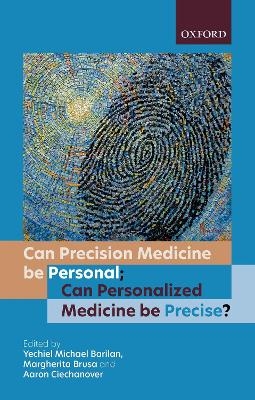
Can precision medicine be personal; Can personalized medicine be precise?
Oxford University Press (Verlag)
978-0-19-886346-5 (ISBN)
This evolving vision of 'personalized medicine' is in the forefront of medicine, creating debates among ethicists, philosophers and sociologists of medicine about the nature of disease and the definition of wellness, the impact on the daily life of patients, as well as its implications on low-income countries. Is increased 'precision' also an improvement on the personal aspects of care or erosion of privacy? Do 'precise' and 'personalized' approach marginalize public health, and can this care be personalized without attention to culture, economy and society?
The book provides a multidisciplinary and interdisciplinary discussion of the ethos and ethics of precision/personal medicine, involving scientists who have shaped the field, in dialogue with ethicists, social scientists and philosophers of science. The contributing scholars come from all over the world and from different cultural backgrounds providing reflective perspectives of history of ideas, critical theory and technology assessment, together with the actual work done by pioneers in the field. It explores issues such as global justice, gender, public health, pharmaceutical industry, international law and religion, and explores themes discussed in relation to personalized medicine such as new-born screening and disorders of consciousness.
This book will be of interest to academicians in bioethics, history of medicine, social sciences of medicine as well as general educated readers.
Yechiel Michael Barilan was born and educated in Israel. He is an expert in Internal Medicine and js most recently a senior physician in the Covid-19 Dept. and Emergency Dept. Tel Aviv Medical Centre. He is a full professor in the Tel Aviv University School of Medicine, specializing in ethics and social history of medicine. He is also a member of national and international ethics committees and is an author of over a hundred peer reviewed academic publications. Margherita Brusa earned a PhD in bioethics from the University Complutense of Madrid, and a second PhD in paediatric healthcare planning from the University of Padua. She has served in ethics committees in Spain, USA, and Italy, and led the creation of the first ethics committee in the Palestinian Authority. The focus of her research is bioethics and children. Aaron Ciechanover is an Israeli physician and scientist working currently at the Faculty of Medicine of the Technion-Israel Institute of Technology in Haifa, Israel. He received his MD (1972) from the Hebrew University of Jerusalem and PhD (1982) from the Technion, where along with Professor Avram Hershko and in collaboration with Professor Irwin Rose (Philadelphia, USA) he discovered the Ubiquitin Proteolytic System, a discovery which awarded them numerous prizes, including the Nobel Prize in Chemistry (2004). He is a member of many learned bodies, including the National Academies of Sciences and Medicine of the USA (Foreign Associate), and the Pontifical Academy of Sciences at the Vatican.
| Erscheinungsdatum | 11.02.2022 |
|---|---|
| Verlagsort | Oxford |
| Sprache | englisch |
| Maße | 139 x 217 mm |
| Gewicht | 426 g |
| Themenwelt | Informatik ► Weitere Themen ► Bioinformatik |
| Studium ► 2. Studienabschnitt (Klinik) ► Humangenetik | |
| Studium ► Querschnittsbereiche ► Prävention / Gesundheitsförderung | |
| Naturwissenschaften ► Biologie ► Genetik / Molekularbiologie | |
| ISBN-10 | 0-19-886346-2 / 0198863462 |
| ISBN-13 | 978-0-19-886346-5 / 9780198863465 |
| Zustand | Neuware |
| Informationen gemäß Produktsicherheitsverordnung (GPSR) | |
| Haben Sie eine Frage zum Produkt? |
aus dem Bereich


